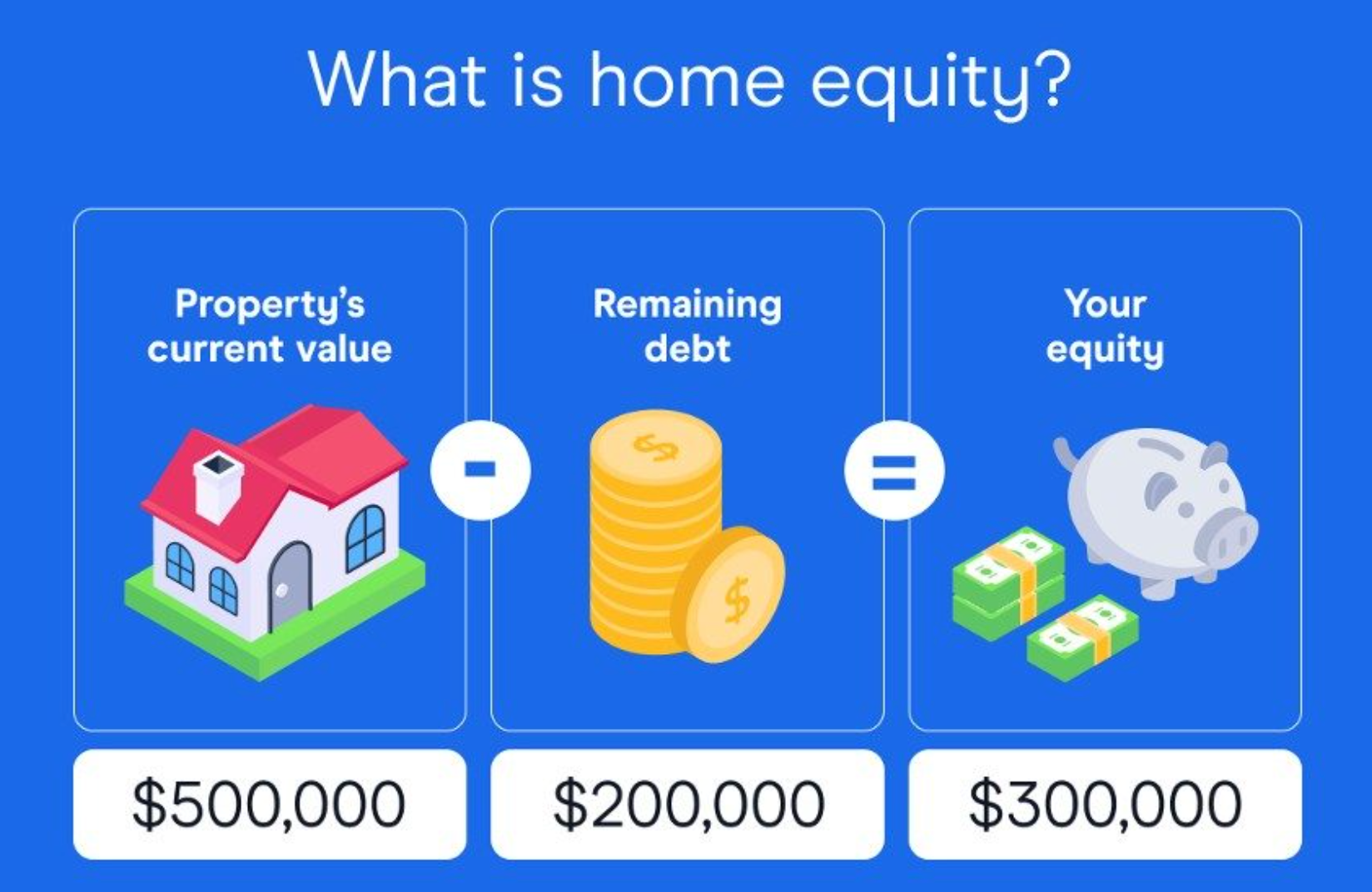Are you looking to unlock the hidden capital in your home? Home equity (or cashing out equity), is a common way to unlock capital via your most valuable financial asset. This can be leveraged for various purposes, including investments, renovations, and debt consolidation.
Understanding the equity in your home is crucial to making informed decisions about your financial future, particularly when you have the help of a mortgage broker such as the top brokers in Sydney and Melbourne. Let’s dive in and unlock the potential of cash out refinancing to access your home’s equity!
Short Summary
- This article outlines the steps to accurately calculate one’s home equity by assessing their property’s current market value and determining the outstanding loan balance.
- Accessing your home’s equity involves cash out refinancing, loans, and lines of credit with varying advantages and limitations, as well as lending criteria that should be considered before making a decision.
- We recommend speaking to a professional who can guide you correctly using their experience and knowledge, so you are given multiple options and strategies to choose from.
- It is important to evaluate income, expenses, debts, and assets before accessing your home’s equity in order to ensure it aligns with long term plans while considering the increased debt associated with taking out a home loan.
Understanding Home Equity: The Basics

Think of your home’s equity as access to capital that has been built up in your property. It is the difference between your property’s market value and your outstanding home loan balance. As you pay off your home loan and the value of your property increases, the amount of home equity grows, providing you with a valuable financial resource.
So how can you make the most of your home’s equity? There are various ways to utilise it, from funding renovations to investing in a second property or even consolidating debt with higher interest rates. To harness the true potential of your equity, you need to have a clear understanding of how much equity you have and how to calculate it.
How to Calculate Your Home Equity

Calculating your existing total equity, also known as home equity, is easier than you might think. It involves two key steps: assessing your property’s current market value and determining your outstanding home loan balance.
In the following sections, we’ll guide you through these steps to ensure you have an accurate estimate of your home equity.
Property Value Assessment
To assess your property’s value, you can consult a property listing site like realestate.com.au or domain.com.au and review recent sales in your suburb. Factors like market growth and recent sales in your area play a crucial role in determining your property’s value. For a more accurate estimate, you may also consider obtaining a professional valuation.
Keep in mind that property values can fluctuate due to various factors, such as market conditions, economic trends, and changes in your neighbourhood. Staying updated on these factors will help you maintain an accurate estimated property value and your home’s equity.
Loan Balance Considerations
Next, you need to determine your outstanding home loan balance. This is the amount you still owe on your home loan, which can be found by contacting your lender or checking your home loan statement. Remember to consider any additional repayments or redraws, as these can affect your current loan balance.
By combining your property value assessment and loan balance considerations, you can now calculate how much equity in your home: subtract your outstanding loan balance from your property’s current market value. And voilà! You’ve unlocked the treasure within your property.
Accessing Your Home Equity: Options and Limitations

So, you’ve discovered how much capital is in your home, but how do you access it? There are three primary methods: cash out refinancing, home equity loans, and lines of credit. Each option has its own advantages and limitations, so it’s essential to weigh the pros and cons before making a decision.
Keep in mind that lenders have distinct standards for the amount of equity that can be borrowed, which is contingent upon your financial situation and mortgage structure. To ensure a smooth process, it’s crucial to familiarise yourself with the lending criteria and requirements set by your lender.
Fees and Costs Associated with Home Equity Loans
Before diving into the world of house equity loans, it’s essential to be aware of the fees and costs involved. These may include application fees, valuation fees, lenders mortgage insurance (LMI), loan establishment fees, and ongoing fees. Keep an eye on these costs as they can impact your overall financial situation.
LMI, in particular, is a fee that may be required when borrowing an amount greater than 80% of the value of the property. Being aware of these fees and costs can help you make informed decisions, ensuring your equity journey is a rewarding and financially sound one.
We always recommend that if you can avoid it, you should not cash out more than 80% as this is where fees and charges as well as interest rates increase significantly.
Maximising Your Borrowing Power

To make the most of your home’s useable equity, it’s crucial to maximise your borrowing power. This involves maintaining a good credit score, having a stable income, and keeping debt levels low. These factors can help you qualify for larger loans and more favourable loan terms, granting you greater access to your home’s equity.
Another helpful tool in estimating your borrowing capacity is an online calculator, which can assist you in determining the amount of borrowing that is possible and the loan terms that may be attainable. By maximising your borrowing power, you can unlock the full potential of your equity.
Australian Credit Licence Requirements
To ensure you receive accurate advice and assistance, it’s essential to deal with a licensed credit provider or mortgage broker. These professionals can help you navigate the complexities of cash out equity loans and home loans, ensuring you make the most of your borrowing power and achieve your financial goals.
By working with a licensed credit provider or mortgage broker, you can be sure that you are dealing with a licensed credit provider or mortgage broker.
Using Home Equity for Investment and Growth

Your equity can be a powerful tool for investment and growth. One popular option is using your home’s equity to purchase an investment property, which can serve as an additional source of income or a long-term investment.
Another option is using your existing equity to fund renovations, potentially increasing the value of your property and creating even more equity.
Regardless of the investment path you choose, leveraging your home’s equity can be a smart way to build wealth and secure a brighter financial future. Just remember to carefully assess your financial situation and goals before tapping into your home’s equity.
Home Equity Calculators: A Helpful Tool
Using a home equity calculator is a convenient way to estimate your potential borrowing amount based on factors like property value, loan balance, interest rate, and loan term. This tool can quickly provide an estimate of the amount of cash you can access from your home equity, making the process more manageable and less time-consuming.
Keep in mind that home equity calculators are not an offer of credit and may not include all applicable fees. It’s always a good idea to seek professional advice and work with a licensed credit provider or mortgage broker to ensure you receive the most accurate and up-to-date information regarding your home equity.
Assessing Your Financial Situation
Before accessing your home equity, it’s crucial to assess your financial position and ensure that using your home equity aligns with your long-term plans and goals. This involves evaluating your income, expenses, debts, and assets, as well as considering potential financial goals like budgeting, saving for retirement, and establishing an emergency fund.
Remember that taking out a home equity loan also means taking on more debt, which could lead to higher repayments or an extended loan repayment period. Carefully assessing your situation will ensure you can manage the increased debt and make the most of your home equity.
Navigating Lending Criteria
Lending criteria and requirements can sometimes be overwhelming, but familiarising yourself with them is vital to increase your chances of loan approval when accessing your home equity. Factors such as debt-to-income ratio, credit score, credit history, and financial profile play a significant role in determining your maximum loan amount.
Working with a licensed credit provider or mortgage broker can help you navigate the complexities of lending and ensure you’re well-prepared for the loan application process. By understanding the lending requirements, you increase your chances of successfully accessing your home equity.
Summary
In summary, understanding and calculating your home equity is a crucial step in unlocking the hidden wealth within your property. By carefully assessing your financial situation, maximising your borrowing power, and familiarising yourself with the criteria, you can make the most of your home equity and achieve your financial goals. Now is the time to take control of your financial future and unlock the potential of your home equity!
Frequently Asked Questions
How is equity calculated?
Equity can be calculated by subtracting the amount of any loans secured against a property from its appraised value, or taking the value of a home and subtracting any outstanding mortgage debt or liens.
For a business, it is the difference between its total assets and liabilities.
How much can you borrow against equity?
You can typically borrow up to 80% of your home’s value against your useable equity, which is calculated by taking 80% of your home’s value minus any existing debt. Some lenders do cash allow you to cash out to 90%, speak to a mortgage broker to see which lender and product is best for your specific loan requirements.
What is home equity?
Home equity is the difference between the market value of a property and any outstanding loan balance. It is essentially an owner’s financial stake in their property.
What fees and costs are associated with home equity loans?
Home equity loans may come with additional costs, such as application and establishment fees, LMI, valuation fees, and ongoing fees.
FAQs
Equity is the difference between your home’s market value and the remaining balance on your mortgage. It represents the portion of your home that you own outright.
Cash-out refinancing replaces your existing mortgage with a new one, allowing you to borrow more than you owe and take the difference in cash.
To calculate your equity, subtract your current mortgage balance from your home’s current market value.
Benefits include accessing funds for home improvements, debt consolidation, or other financial needs, often at a lower interest rate compared to personal loans or credit cards.
Risks include increasing your mortgage balance, extending your loan term, and potentially higher monthly payments. It’s essential to assess your financial situation carefully.
The amount you can borrow depends on your lender’s policies and the amount of equity in your home. Lenders typically allow you to borrow up to 80% of your home’s value.
Costs can include closing fees, appraisal fees, and potentially higher interest rates. It’s important to compare these costs against the benefits of the refinance.
Qualification depends on factors like credit score, income, debt-to-income ratio, and the amount of equity in your home. Lenders will assess your overall financial health.
Required documents typically include proof of income, tax returns, bank statements, and details of your current mortgage. Check with your lender for a complete list.
The process usually takes 30 to 45 days, depending on your lender and the complexity of your financial situation.
Yes, funds can be used for various purposes, such as home renovations, paying off debts, or funding major expenses like education or medical bills.
Interest on the new loan may be tax-deductible if used for home improvements. Consult a tax advisor to understand the specific implications for your situation.
